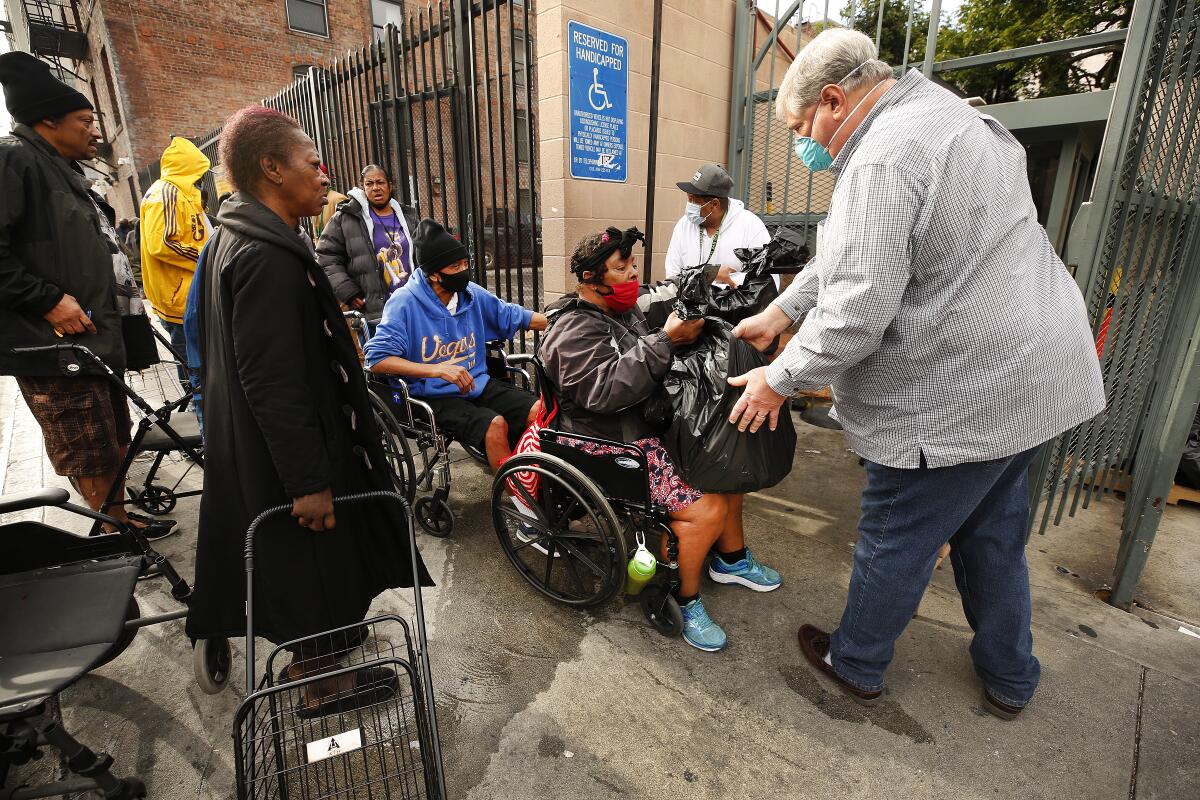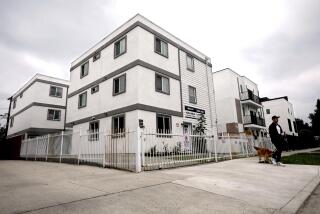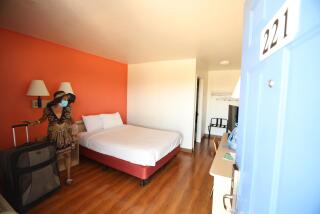Editorial: The only heartbreak hotels during the pandemic are the ones that wonât let homeless people in

When a hotel in Lawndale agreed to house particularly vulnerable homeless people during the coronavirus pandemic, Lawndale officials offered a special greeting: The city attorney sent a letter to the hotel threatening to revoke its permit. Then another Lawndale official called L.A. Countyâs Building and Safety Division to inquire about shutting off the hotelâs power if the permit were revoked. (The power has stayed on and the homeless guests have stayed in.)
In Norwalk, the City Council passed an ordinance prohibiting the use of hotels and motels to house homeless people without the cityâs approval. But a judge issued a temporary restraining order this week barring the city from stopping one hotel from housing the homeless during the current crisis.
And in Covina on Friday, residents staged a protest outside another hotel that has agreed to house homeless people. One protester held a sign reading âHomelessâ with a big X through it followed by âNot Behind My House.â At the moment, the county still plans to move homeless people there.
NIMBYism against housing for homeless people is bad enough during normal times. But during a pandemic, itâs appalling.
In the race to prevent the coronavirus from infecting swaths of homeless communities, hundreds of hotels and motels across the state have answered what is nothing less than a call to public service in a dire emergency. They have turned over thousands of rooms to homeless people who are 65 and older or have an underlying medical condition. These are the people most at risk of getting seriously ill if they contract COVID-19 and, for obvious reasons, they are unable to keep themselves safe by staying home.
Project Roomkey, as itâs known, has resulted in more than two dozen hotels in Los Angeles County offering more than 2,600 rooms. Itâs not exactly charity work; the hotels get paid for three months of room rentals, can put some of their staff back to work and get reimbursed by the county for any damage to their property. The Los Angeles Homeless Services Authority selects the people who will stay in the hotels.
But some cities have worried about âpotential loitering and other nuisances by homeless guests,â as Lawndaleâs website puts it. In Covina, the city manager said that residents living near the hotel in question might be concerned to see people they didnât recognize walking around. (What, the hotel usually provides rooms only to people from the neighborhood?)
Even the chief executive of PIH Health Whittier Hospital wrote a letter to the mayor of Whittier telling him that the 85 nurses, doctors and other healthcare personnel who work in COVID-19 units and are now being housed at the nearby Doubletree Hotel would move out if homeless people were allowed to move in. âAlthough that is a noble idea,â wrote James R. West, it is ânot a compatible arrangement.â County officials agreed not to use the Doubletree.
And despite securing numerous contracts with hotels across L.A. County, by Wednesday afternoon county officials had not signed up any of the hotels with 100 rooms or more in and around downtown Los Angeles, where the need is greatest for housing homeless people. (Five small hotels downtown have signed on.) According to a spokesperson for the Hotel Assn., hotels worry that their staff and managers are ill-equipped to deal with substance-abusing or mentally ill homeless people who might become disruptive in hotels.
To which we ask: How do they deal with indulgent, substance-abusing rock stars and celebrities trashing hotel rooms? Bear in mind, the county is looking to house only elderly or medically vulnerable homeless people. And besides, itâs supplying homeless services providers and security staff and pledging to cover any damage.
City officials have complained that they were never consulted or even informed before the county signed up hotels. That may not have been the wisest strategy. County officials now promise to inform cities in a more timely fashion.
Nevertheless, getting vulnerable homeless people off the streets is essential to preventing more outbreaks. There are nearly 59,000 homeless people in L.A. County. Here are the choices: Homeless people living temporarily in a hotel near you, or homeless people sick and dying on a sidewalk near you.
More to Read
A cure for the common opinion
Get thought-provoking perspectives with our weekly newsletter.
You may occasionally receive promotional content from the Los Angeles Times.










